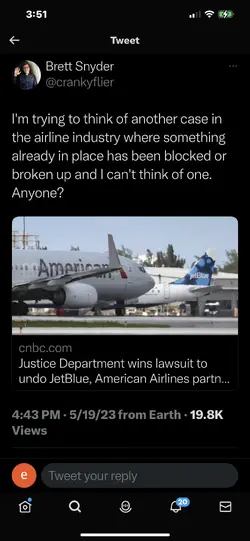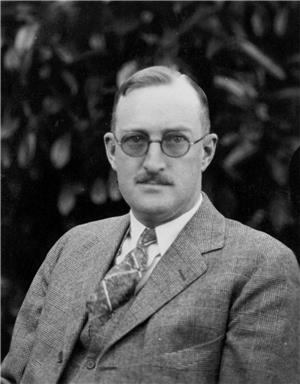So,
AT&T is an airline?
Maybe reading isn't one if your strengths.
But since you mentioned it... it's true
AT&T was broken up into eight separate companies in 1984 after being found to be a monopoly... Within 20 years, six of those companies that were spun out had merged back to become an even bigger company via SBC rebranded as AT&T. The other two became what's now Verizon.
The track record of letting government pick winners and losers seems to indicate that the consumer loses.
In a parallel industry, there's a very long list of railroad mergers that were blocked by the Surface Transportation Board or the Department of Justice. Just about every one of those wound up in a bankruptcy for one of the railroads trying to merge. A merger between the Milwaukee Road with the Chicago North Western was blocked, and the MILW eventually collapses and was gobbled up by the Soo and later the Canadian Pacific (today now merging with the Kansas City Southern). The Rock Island tried to merge with the Union Pacific, but was blocked. The Rock went bankrupt, wound up with the Chicago North Western, which in turn was bought by.... the Union Pacific. The Southern Pacific and Santa Fe were so ready to merge they started painting locomotives in a new post-merger paint before the merger was approved. It wasn't approved, so the paint came off quickly. The Santa Fe wound up with the Burlington Northern, creating an even bigger combination than what the SF+SP would have been. The Southern Pacific wound up close to bankruptcy, and eventually merged with.... the Union Pacific. The story on the east coast is even worse. Remember Conrail?... A bunch of railroad bankruptcies combined with government interfering and forcing six railroads into one company that was eventually broken up in two and sold off to the Norfolk Southern and CSX.
Instead of having a dozen merged railroads some 25 years ago, we now have essentially four railroads plus the two Canadian railroads that bought up their partners in the US. Tens of thousands of jobs were lost with all those bankrupcies and fire sale acquisitions.
Yea, Government Interference!
Not.


